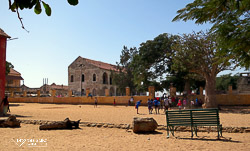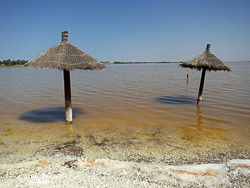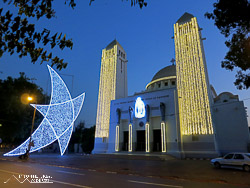Dakar, Senegal
Into Africa
December 25, 2012
Every time I look in the mirror
All these lines on my face getting clearer.
The past is gone.
It went by like dusk to dawn
Isn't that the way
Everybody's got their dues in life to pay
- Aerosmith

Apparently African time is similar to Spanish time. Similar in that it doesn’t have the exact meaning it does in other places. A hurried rush to the gate in Casablanca to catch my connecting flight to Dakar was very unnecessary, as the throng of people crowded in front of the gate attested to. In total, a full hour passed before the plane was even close to moving from the gate. That full hour passed without a single announcement or indication that there was even a delay, that this was abnormal. On the bright side, the delay pushed back my arrival until 1am, not late enough to escape the crowds of people outside the airport but late enough to escape the normally traffic clogged streets of Dakar.
Dakar at night, without that traffic and the hustle and bustle of a booming city of 2.5 million is a vastly different place. The eerily deserted streets are filled with shadows and darkness courtesy of the lack of street lights and few other light sources. By most standards it seems decidedly unsafe and unwelcoming, the discontinuous pavement and sandy patches make walking a challenge, even in the light of day. In the center of the city, the homeless congregate in certain locations, forming silent obstacles that are hard to discern in the darkness. But the quiet that fills the air is remarkable and could almost be peaceful is you were every fully at ease walking the streets that late.

As the Christmas holiday was approaching that quiet was often broken by the sound of exploding fireworks. Despite being a predominantly Muslim country, Christmas is widely celebrated here by most people; however it is more of a festive occasion rather than a religious celebration. A celebration that demonstrates the tolerance of a country that used to be a center of intolerance.
The remnants of those former days can be seen on Isle Goree, a short ferry ride from Dakar. The small peaceful island was once a slave transport point during the slave trade in the 18th and 19th centuries. Near the water, the crumbling Slave House was used to hold slaves in horrendous conditions. The rest of the island is much less depressing, with successive generations of ruins of the Castel on the south of the island. At the top there are rusting WWII guns and expansive views of the harbor and the city of Dakar. Below, the rest of the island is traversed by narrow winding lanes filled with playing children, artisans wooing tourists, and colorful blossoms clinging to faded buildings.

Back on the mainland in the height of the afternoon that peacefulness is shattered. The busy streets teem with street merchants, pedestrians, homeless, and piles of trash. The calm of the residents in the face of the chaos is marvelous but dirty rubbish-strewn streets are disconcerting. But in all fairness it is hard to even find a garbage bin for proper disposal. Any recycling is done by people sifting through the trash and pulling out scrap metal or plastic for second hand uses. The occasional goat fleets through the streets and alleys along with horse carts too. Battered taxis and ancient painted mini-busses clog the streets and contribute to the dirty air.
Negotiating your way through all of this is only made more difficult by fending off countless offers from street merchants and unofficial guides. The merchants persistently strike up conversations and try to bring you to their stores to show you their artwork, which is of course mass produced somewhere. When you decline they try to give you a “free” gift, almost forcefully putting it in your hand, the gift of course is neither free nor a gift. The unofficial guides are almost worse as they will follow you around, continuously talking and then expect money in return for providing information that you never asked for. These countless annoyances ruin things for the few genuine nice people as the only real effective tactic is silence or indifference, which comes across as rudeness.

Dakar itself is very thin on traditional sights. There are a few overpriced museums, a ridiculous monument to the African renaissance with grand views over the sea of non-descript buildings, and the insight into the hard lives that most of the city’s residents lead. The rush to Dakar for a better life has powered the expansion of poor suburbs with a high environmental impact. The sandy dust blown streets are filled with open air markets, traffic jams, and pollution. Beyond the last of these outskirts in an incongruous location is Lake Rose, the ending point of the famous Paris to Dakar race. Here the faint pink hue of the lake and contrasting white salt mining have generated an overrated tourist attraction that is, like Dakar, filled with the hassle of touts and unofficial guides. At least there the hot and dry air is relatively clean and the atmosphere calm.
The only place in the center of Dakar that can claim the same is at the far southern tip of the peninsula. There, past the abandoned and broken down former Palace of Justice, the sheer cliffs drop to the ocean and the sounds of pounding surf echo upwards. On top of former military fortifications a panoramic view of the sunset unfolds for the residents lucky enough to find it. Here the tranquility seems far removed from the chaos, noises, and smells of central Dakar. But it isn’t enough for the birds to stop as they swoop down to skim the ocean before heading elsewhere.

Before I could head somewhere else I needed to get a visa to pass through Mauritania to the north. As I waited outside the gated walls of the consulate with a handful of other people I realized that time seemed to be less important here too. Almost 30 minutes late the door was finally opened and we were shown into a waiting room with a large long oval table. Here we waited for another 45 minutes until the consular official arrived and dispensed the visa application forms. Three of the people waiting were from Guinea and were going to work in Mauritania because there they could make 85 Euros a week. Good money for them. Unfortunately for them, they were illiterate so they needed someone to help them fill out the application form. There were a few Moroccans headed back home, a German working in Guinea-Bissau driving home, an older French traveler, and some other random locals. The procedure was relatively smooth after the delays, and I was told to come back at 4pm to pick up the visa.
At 4pm I rejoined the rest of those that had applied outside the gates. Not surprisingly, we waited. And waited. At almost 5pm the deadbolt to the door slid open and we were ushered inside with no explanations. The two Moroccans smiled at me and said, with a shrug of their shoulders, “C’est l’Afrique.”
























































